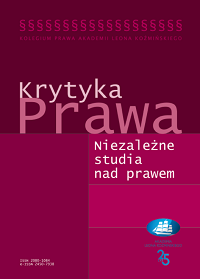The Future of Conventional Coal Plants
in the Light of the International Law
and the European Law
The Future of Conventional Coal Plants
in the Light of the International Law
and the European Law
Author(s): Jerzy RotkoSubject(s): Energy and Environmental Studies, Law on Economics
Published by: Akademia Leona Koźmińskiego
Keywords: climate change; Paris Agreement; legislative package “Clean Energy For All Europeans”; decarbonisation of economy; energy mix
Summary/Abstract: Climate change is one of the key civilisational issues. This change is caused bygreenhouse gas emission. Stopping this change requires multidirectional actionson a global scale, primarily limiting the combustion of fossil fuels. What reachestowards these needs is the proposals of the international community, which aredetermined in the protocol of 15 December 2015 (called the Paris Agreement). Thelegal framework for the strategy of implementing it in the European Union andthe member states is formulated by the legislative package “Clean Energy For AllEuropeans”. The directions and terms of developing the economy pose particularchallenges for Poland which plans to maintainthe significant role of coal in theenergy industry for decades.Government documents show that the government of the Republic of Polandwill not decide on the spectacular decarbonisation of the economy. It cannot be obligatedto do it, either, due to the treaty conditions. However, the future of the coalenergy industry seems prejudged. This results from the development directionsof European economic-legal instruments which serve the direct (determining bindingemission standards and environmental quality standards) and indirect (throughinfluencing the prices of greenhouse gas emission allowances) rationing of theactivity of entities from the energy sector in the environment.
Journal: Krytyka Prawa
- Issue Year: 11/2019
- Issue No: 4
- Page Range: 326-348
- Page Count: 23
- Language: English

